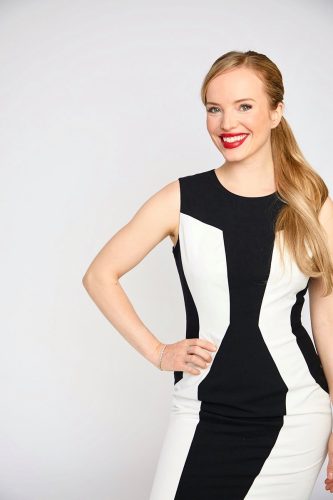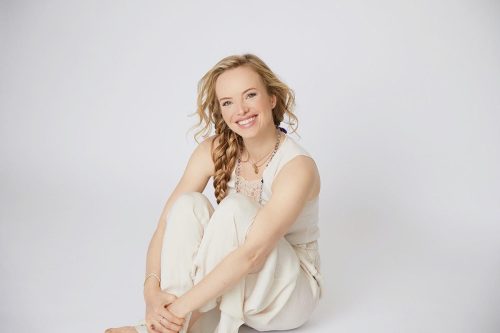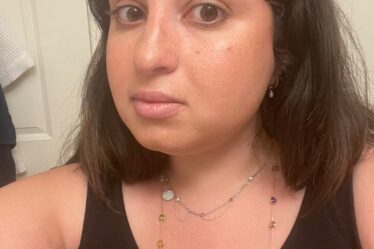
Claire Hosterman doesn’t just offer voice lessons, she provides a replenishing of the soul. “People leave feeling way better than when they came in,” she reflects. “Usually people leave and they’re so happy and elated and they always tell me, ‘Oh my gosh, this is like therapy as well. I feel so light, I feel so amazing. This is changing my life on so many levels, not just singing.’ And that’s the whole point. That’s what I love about this work is, in my opinion, the correct full body embodied, holistic way to approach singing is the mind, body, and spirit. I read people on the emotional level, the spiritual level, the physical level, and I help them integrate parts of themselves in order to actually hit the high notes and sing. It’s like a chiropractic adjustment, but we don’t even really talk about spiritual things. It happens very subtly and silently as we’re doing all our warmups. It’s a very amazing phenomenon. I’ve always been such a healer and it naturally happens without people even knowing that it’s happening.” Her teaching is as equally technical as it is ideological. “I teach people from all over the world, all ages, all stages. I teach people in the industry. I work with a lot of actors and singers on TV shows. My job is to help them become the best singers they can be and help them sing eight shows a week without becoming tired. Help them have longevity. Because it doesn’t matter at the end of the day if your voice sounds amazing, but you have a sore throat all the time and you’re burning out. It’s important that you sound great, but also that it’s sustainable. That’s what I love. It’s like a cleansing and you feel amazing when you’re done, but also you feel a certainty in your technique. I love both. It’s not enough for me to just do the physical, ‘Okay, here are these exercises,’ because clearly a lot of the time we have mental blocks, and so the work requires that you pay attention to the beliefs you have and not just the physical exercise, because that’s going to only take you so far.”
She understands the apprehension of some of her students, having started from a similar place. “When I first started, I was 15. I was super shy,” Claire admits. “This man was teaching in our house and he was using our grand piano. We let him use our house for his singing lessons. So students would come over and in exchange he would give me and my sister singing lessons. My voice was all over the place. I couldn’t hit a lot of notes. I had pitch issues. My mom was actually kind of worried. It’s a joke now because my pitch is amazing, but at first I was not at all what you would think of as a talented singer.” Practice propelled her forward and opened many doors for her. “After working super hard for a couple years, my voice grew exponentially. I was considering having a career in opera and going to Broadway. It was so fast. And I realized, with the right teacher and the right technique, you can really see amazing results. I saw other teachers and some of them were amazing and some weren’t. Not all teachers are the same.” Her vocal prowess also gave her a soft place to land when postgrad existentialism began gnawing at her nerves. Her mom recommended she teach singing and Claire eventually agreed. “When I graduated, I had a few clients that my mom recommended to me. Slowly, it started to grow. At first I was doing it because it felt like there wasn’t anything else I could do, but then I realized I’ve always been such a healer. I thought I wanted to be a therapist when I was little because I love listening to people and hearing their problems, but also healing them, except letting them heal themselves. You’re just the conduit. I started unconsciously realizing that people were blocked in some emotional, spiritual way.”
The most imperative teaching method is actually allowing the student to guide you. “I loved the physical aspect of lesions too,” Claire gushes, her eyes sparkling. “I discovered that I’m such a physical person. I grew up playing sports. I communicate through my body. So because I communicate through the body and I was able to sense them and what they needed physically, I’d give them an adjustment with the exercise. But then I would also see the emotional aspect. I can’t even explain it, but it would happen. We all have a gift and my gift comes in the form of healing. Whatever I do is through healing. If I sell tires on the side of the road for cars, I’m going to impact people with healing. It just came through that filter. I love helping people and I love helping them find their voice, their metaphorical voice. They were starting to own their power more. I love the beauty of singing. I love the art, but I also love the empowerment that comes with it and the joy in their eyes when they get it. They unlock the next level, but they also have unlocked a part of themselves to get to that level. It’s a transformation. More often than not, they cry, but in a good way. They’re crying out of happiness, they’re healing, they’re transforming in all areas of their life. It’s this magical phenomenon.” Meanwhile, the student must learn to transcend ego, expectation, and fear of failure. “Everyone’s at their own level of self-worth. I mean, so much of singing is about self-worth, which I love. The more you expand into your self-worth, the more you can actually hit the high note. Because truthfully, you really don’t even need your mind for singing. You maybe need 1 or 2% of your brain and that’s it. The rest is in your body. I joke that if I woke you up in the middle of the night and told you to get out of bed and sing this high note, you’d be confused, but you’d do it automatically. You wouldn’t be thinking because your brain wasn’t awake yet to judge you. When we’re fully awake, we’re in our programming and judgment, but when we’re tired or out of it, we actually often do our best because we’re not getting in our own way. You know so much. I always tell my students, ‘You know this. You actually know how to do this. I’m just helping you remember. I’m helping you get out of your own way.’ Often the people who get it the fastest are the ones who know how to get out their own way. If I tell you to do something and you’re just pure and open, your body knows how to do it. A lot of people start off with me saying, ‘I hate my voice,’ even though they’re professional actors or maybe they’re a singer that people like on TikTok and people recognize them. It might look like they love their voices, but they don’t. Their self-esteem is lower and they have all these beliefs about their voice in general and their voice actually relates to themselves.”
With continuous work, perspectives can and do evolve. It’s a delicate tango of confidence and intuition. “I would say there’s just more of a groundedness,” Claire says, reflecting on long term clients. “I would say there’s a trust in the body, A trust that you can leap and your technique is going to appear and help you instead of, ‘I’m going to make this sound and I don’t trust myself.’ It’s like, ‘I’m going to make the sound and I’m going to lean back. And I know that even if I crack and honk, I can stretch and I can trust that my sound will come out and I won’t have to control it in all these weird ways. So there’s a trust of the body. There’s a trust in myself and my abilities and not being so hard on ourselves. The more afraid you are to crack, the more likely you are to crack. There slowly becomes a softening to how you view making mistakes. The people who succeed the most are the ones who are failing all the time, who allow themselves to make mistakes, who allow themselves to fail and not be perfect. They actually see the most growth. At the end of our sessions, there’s way more of a self-acceptance and comfortability in terms of trusting one’s body and one’s own instincts. Because when I say, ‘Okay, make this sound like me,’ you might start and catch yourself, but what was that impulse? You had it. And then they have it, but then they stop it. When they get out of their own way, the body almost always gets it. So that’s what I love. It’s like a trust of one’s self and of one’s instincts. We’re taught in school that we can’t trust the body and we have to trust the brain. But the problem is you can’t get to singing through the brain. You get to singing through the body. And so we have to get the mind out of the way.” As such, honing your singing abilities frequently involves rewiring your brain. “When we’re in this constant state of stress and fight or flight and attention and thinking, we can’t function properly. We can’t think, speak properly, or make good decisions. We can’t sing properly because we’re in this frazzled state. Much of it is getting into resetting the nervous system, which is now all over Instagram. It’s about calming the nervous system and getting grounded. In that way, we might have a history of tension, but we can at least practice getting more embodied and grounded so that over time, you have less of a reaction.”
Claire is glad to see the industry trending towards an overdue acknowledgement of the impact of physical and mental harmony (or lack thereof) on vocal technique. “I think so many teachers are doing their best. They’re just doing physical exercises and a lot of these exercises are limited,” she admits. “I actually never went to a proper school. I studied with masters. The whole point of going to a school is to find the right teacher. So I found my teachers, but some of these people went to these fancy schools and they learned the same stuff. It’s very basic. It’s a vocal technique, but it doesn’t go into the mind, body and spirit. It’s not a holistic approach. I think in 10 or 20 years, every singing teacher is going to be talking about the mind, body, spiritual, and emotional connection with singing.” She considers herself an archaeologist, gradually unearthing her students’ true selves. “It’s like a cicada shedding its skin. What I love telling students is that we’re not helping you become something. We’re not adding more layers on top. We’re actually helping you unbecome those parts of you until we take off all the things that aren’t you that you’ve been carrying around and you put on over the years. We’re taking them off to reveal you. You’re already there. It’s the stuff that’s getting in the way, that’s on top, that we want to take down. There is a shedding and there is an unbecoming with singing and there’s a magic because we’re not fixing. We’re actually just helping you get back to you, which is already perfect and whole and amazing. It’s very much like being on top of a frozen ice lake, like a river that’s frozen on top but underneath, you can hear the life that’s flowing. If you listen, you can actually hear their life force underneath the frozenness of all their conditioning. Every time you put little cracks in it or melt it, it’s a very gentle process. Kind of feminine. It’s not masculine, like pushing and forcing. Well, I’d say it’s balanced because you’re actively doing something, but you’re also allowing.” Even she had to reevaluate her overemphasis on certain timelines or outcomes. “When I first started as a teacher years ago, I was so scared that I wasn’t good enough and that my technique wouldn’t be good or I wouldn’t be able to help people. So I was judgmental of myself. And it would come out in the form of almost being a little pressury with my students. I would get frustrated if they weren’t getting it because I would feel like that meant that I wasn’t a good teacher. But instead it’s a sitting, it’s an allowing, it’s knowing that life takes its time. A baby takes its time. Nature takes its time and you sit with the person and you gently unravel together but there’s no forcing. There’s just a listening and an allowing.” Patience is indeed a virtue coaxed by time and experience. “You can’t rush this process. Because singing is connected to our body, we somehow think it’s going to be different than if you picked up a musical instrument, like the piano that takes years. We have to be gentle with ourselves and not have such unrealistic expectations. We have to know that this does take time. It’s a journey and you have to be curious and open to succeeding and also open to making mistakes. It’s radical self-acceptance.”
 Our hyper focus on an impossibly narrow version of success can lead us astray from both purpose and pleasure. “I think we have an obsession in our culture of having a gift, as if that is our worth. And often the gift has to be in the form of entertainment because our culture is so focused on entertainment. It’s a weird pressure. We’re looking at ourselves from the outside. Why can’t we actually live from the inside like a curious child and get excited about something and not have it be about having a gift? Like with kids, we shouldn’t be so focused on gifts and be more about living a fun life.” Imagined deadlines blight blossoming talents, and more importantly, the delight they bring. “My students have all this pressure. They’ll say, ‘If I’m not famous by the time I’m 20, I’m just not going to do it.’ That’s what gets in the way of their progress. You’re putting so much pressure on yourself to have a result and get famous. We should never put that much pressure on our art. You can’t do that. It’s the metaphor of the butterfly. When you’re looking for the butterfly, it doesn’t appear. But when you give up, the butterfly appears. Just stop obsessing and trying to get the result and just get curious and be humble. Give yourself permission to not be good at something at first.” Watching her students go on to thrive validates her own trajectory. “I feel so proud. I feel like I’m going to explode with happiness. Sometimes I feel like I want to cry because I’ve seen their journey and how far they’ve come and it reminds me of my own journey and my own struggles and triumphs. My heart melts. I feel like I’m on the right path of helping people and being helped. They in turn help my own growth as a human in the challenges they give me and the successes. Every single thing they do, I feel like I’m becoming a better person with them.”
Our hyper focus on an impossibly narrow version of success can lead us astray from both purpose and pleasure. “I think we have an obsession in our culture of having a gift, as if that is our worth. And often the gift has to be in the form of entertainment because our culture is so focused on entertainment. It’s a weird pressure. We’re looking at ourselves from the outside. Why can’t we actually live from the inside like a curious child and get excited about something and not have it be about having a gift? Like with kids, we shouldn’t be so focused on gifts and be more about living a fun life.” Imagined deadlines blight blossoming talents, and more importantly, the delight they bring. “My students have all this pressure. They’ll say, ‘If I’m not famous by the time I’m 20, I’m just not going to do it.’ That’s what gets in the way of their progress. You’re putting so much pressure on yourself to have a result and get famous. We should never put that much pressure on our art. You can’t do that. It’s the metaphor of the butterfly. When you’re looking for the butterfly, it doesn’t appear. But when you give up, the butterfly appears. Just stop obsessing and trying to get the result and just get curious and be humble. Give yourself permission to not be good at something at first.” Watching her students go on to thrive validates her own trajectory. “I feel so proud. I feel like I’m going to explode with happiness. Sometimes I feel like I want to cry because I’ve seen their journey and how far they’ve come and it reminds me of my own journey and my own struggles and triumphs. My heart melts. I feel like I’m on the right path of helping people and being helped. They in turn help my own growth as a human in the challenges they give me and the successes. Every single thing they do, I feel like I’m becoming a better person with them.”
Claire wants to remind us that singing should be a dream accessible to everyone. “If anyone is ever considering singing and they have it in their heart and they’re just sitting on the fence like, ‘It’s always been a dream, but I don’t know, I’m a stay at home mom. It’s just silly. I’ll just sing around the house.’ Do it, take up lessons. It’s actually important that you are fulfilled with your own song, your metaphorical song, and that you are filled with joy. The world needs more people and singing who are joyful. Singing is one of the most joyful, humanistic things you can do for your heart and for others. And so if anyone’s ever on the fence saying, ‘I don’t know, I feel like I should, but I missed the window. I’m too old and I can’t,’ no you’re not. You’re never too old. You’re never too young. You can start today. Women’s voices actually don’t hit their most beautiful peak until they’re at least in their forties. So it just gets better as you get older.” Passions are only ever limited by the artificial constraints we place upon them. Anyone can sing their heart out! Book a session with Claire HERE.
Read more Celebrity Interviews on ClicheMag.com
Hollywood Vocal Coach Claire Hosterman Helps Singers Soar to New Heights. Photo Credit: Dana Patrick.



